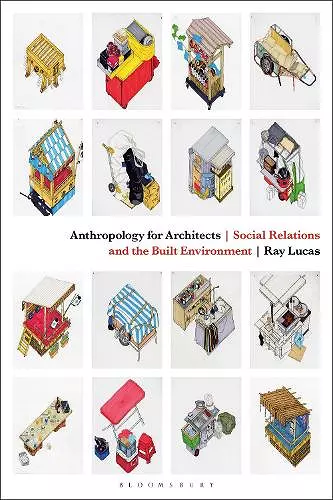Anthropology for Architects
Social Relations and the Built Environment
Format:Paperback
Publisher:Bloomsbury Publishing PLC
Published:6th Feb '20
Should be back in stock very soon

An illuminating exploration of the correspondence between contemporary social anthropology and architecture, with a focus on design processes and choices.
What can architects learn from anthropologists? This is the central question examined in Anthropology for Architects – a survey and exploration of the ideas which underpin the correspondence between contemporary social anthropology and architecture.
The focus is on architecture as a design practice. Rather than presenting architectural artefacts as objects of the anthropological gaze, the book foregrounds the activities and aims of architects themselves. It looks at the choices that designers have to make – whether engaging with a site context, drawing, modelling, constructing, or making a post-occupancy analysis – and explores how an anthropological view can help inform design decisions.
Each chapter is arranged around a familiar building type (including the studio, the home, markets, museums, and sacred spaces), in each case showing how anthropology can help designers to think about the social life of buildings at an appropriate scale: that of the individual life-worlds which make up the everyday lives of a building’s users. Showing how anthropology offers an invaluable framework for thinking about complex, messy, real-world situations, the book argues that, ultimately, a truly anthropological architecture offers the potential for a more socially informed, engaged and sensitive architecture which responds more directly to people’s needs.
Based on the author’s experience teaching as well as his research into anthropology by way of creative practice, this book will be directly applicable to students and researchers in architecture, landscape, urban design, and design anthropology, as well as to architectural professionals.
At home, visiting shops and markets, travelling on foot or by public transport, taking part in festive events or eating a meal, we are all the architects of our daily lives. The spaces we create are the typical haunts of anthropologists. But it takes the talent of an architect to reveal their organisations, geometries and sensory variations. Here, bringing his own eye and pencil to the task, Ray Lucas spells out with clarity and conviction the scope of a truly architectural anthropology. * Tim Ingold, FBA, FRSE, Emeritus Professor of Social Anthropology, University of Aberdeen, UK *
[Lucas] is exceptionally well placed to address this complex field, producing an informed, erudite, useful and refined text without falling into the traps of reductionism. He is an expert anthropologist, architect, ethnographer and urbanist, a trained observant with fine artistic sensibility and skills... This is an eloquent book to learn from, with hidden depths to explore, and to get inspired by. A pleasure to read. * Darko Radovic, Keio University, Japan *
Lucas is a personable and patient guide to the different ‘attentions’ and ‘slow engagement’ that architects can learn from anthropology. An impressive encapsulation and range of key anthropological frameworks for understanding the socially constructed aspects of architecture percolate the text. Lucas takes us from homes to museums, marketplaces, sacred spaces, festivals and food events, immersing the reader through clear writing and his own graphic anthropology techniques. Drawing from his fieldwork in Japan and Korea, intertwined with explanations of theories of practice, the book demonstrates architecture and anthropology’s shared focus on specificity. It draws attention to the temporal aspects of sites, to their nuances and variations, their building and unbuilding of events, that may not usually be in an architectural designer or researcher’s orbit. This book significantly extends work on the everyday and architecture that has much potency for cultures of making the built environment today through research, education and design. * Suzanne Ewing, Professor of Architectural criticism, The University of Edinburgh, UK *
ISBN: 9781474241496
Dimensions: 232mm x 156mm x 16mm
Weight: 620g
264 pages